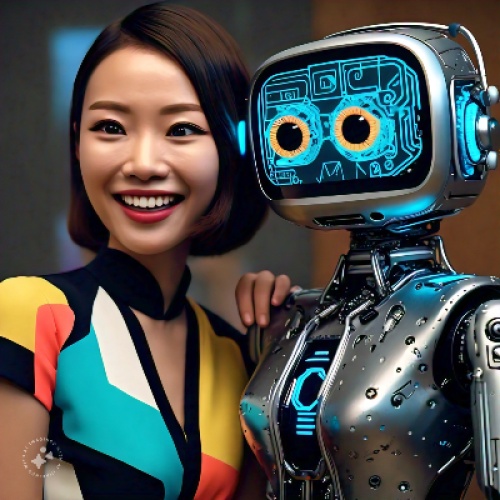"I'm sorry, Dave. I'm afraid I can't do that." - HAL 9000, 2001: A Space Odyssey
In today's world, Artificial Intelligence (AI) has revolutionized industries by automating processes, enhancing efficiency, and facilitating decision-making. But let's not get too serious; imagine a robot making your morning coffee and somehow adding salt instead of sugar. The intersection of AI and human error can be both intriguing and downright hilarious. This essay will provide a descriptive analysis of the impact of AI on human error, the factors influencing this intersection, and strategies to mitigate human error in AI integration.
AI and Human Error: A Match Made in Silicon Heaven or a Catastrophic Comedy?
"To infinity and beyond!" - Buzz Lightyear, Toy Story
AI has shown promise in reducing human error in industries such as healthcare, finance, and transportation through its ability to analyze vast amounts of data quickly and accurately. For instance, AI-powered diagnostic tools can assist healthcare professionals in making more accurate diagnoses, thus reducing the likelihood of human errors. However, there have been instances where over-reliance on AI systems has led to unforeseen errors. Remember the self-driving car that thought a stop sign was a yield sign? Yep, hilarious but also terrifying!
Caption: "When your self-driving car thinks 'stop' means 'slow dance'."
Human Factors: Oops, Did the Robot Just Spill My Coffee?
"Houston, we have a problem." - Jim Lovell, Apollo 13
Human factors play a crucial role in errors related to AI implementation. Picture this: a surgeon is relying on an AI to assist in a delicate procedure, but instead of suggesting a precise incision, the AI suggests a dance move. Hilarity ensues until someone realizes the mistake. Misinterpreting AI recommendations or failing to provide necessary oversight can lead to comical yet potentially dangerous situations.
Caption: "When your AI assistant confuses surgerywith salsa lessons."
Ethical Considerations: Blame It on the AI or the Human Who Programmed It?
"With great power comes great responsibility." - Uncle Ben, Spider-Man
Ethical considerations further complicate the landscape. When an AI-powered decision leads to a detrimental outcome, the question arises: who should be held responsible? The AI, the programmer, or the end-user? These questions underscore the need for a comprehensive understanding of the ethical implications of AI integration. It's like a bad joke: "How many programmers does it take to change a light bulb?" If the AI is involved, the answer might be "None, because the AI turned it into a disco ball!"
Caption: "Blame it on the algorithm, or the guy who coded it after five cups of coffee?"
Fun Fact:
Did you know? The first AI winter was in the 1970s, when enthusiasm for AI drastically decreased due to unmet expectations. Think of it as AI taking a really long coffee break!
Caption: "AI Winter: When robots decided they needed a nap."
Actionable Step:
"Just keep swimming." - Dory, Finding Nemo
To mitigate human error in AI integration, organizations should implement training programs focused on educating individuals on how to effectively collaborate with AI technologies. Transparency and explainability in AI systems can also increase trust and reduce errors. Establish clear protocols for error detection, reporting, and correction to promptly identify and rectify mistakes.
Caption: "Train your team, because even robots need a user's manual."
Conclusion:
"Life is like a box of chocolates. You never know what you're gonna get." - Forrest Gump, Forrest Gump
The choice between a six-month vacation and pursuing a job you love is deeply personal, requiring careful consideration of individual needs and aspirations. While a vacation offers rest and rejuvenation, finding a job that aligns with one's passion leads to long-term career satisfaction and personal fulfillment. By balancingpersonal well-being with professional goals, individuals can make a choice that promotes overall happiness and success. Understanding priorities, values, and long-term vision is key to making the right decision for a fulfilling and rewarding life journey.
Caption: "Navigating AI and human error: Because sometimes life gives you lemons, and sometimes it gives you a dancing robot."
Remember, the intersection of AI and human error isn't just about preventing mistakes; it's also about embracing the hilarity that ensues when things go wrong and learning from those moments.
In today's world, Artificial Intelligence (AI) has revolutionized industries by automating processes, enhancing efficiency, and facilitating decision-making. But let's not get too serious; imagine a robot making your morning coffee and somehow adding salt instead of sugar. The intersection of AI and human error can be both intriguing and downright hilarious. This essay will provide a descriptive analysis of the impact of AI on human error, the factors influencing this intersection, and strategies to mitigate human error in AI integration.
AI and Human Error: A Match Made in Silicon Heaven or a Catastrophic Comedy?
"To infinity and beyond!" - Buzz Lightyear, Toy Story
AI has shown promise in reducing human error in industries such as healthcare, finance, and transportation through its ability to analyze vast amounts of data quickly and accurately. For instance, AI-powered diagnostic tools can assist healthcare professionals in making more accurate diagnoses, thus reducing the likelihood of human errors. However, there have been instances where over-reliance on AI systems has led to unforeseen errors. Remember the self-driving car that thought a stop sign was a yield sign? Yep, hilarious but also terrifying!
Caption: "When your self-driving car thinks 'stop' means 'slow dance'."
Human Factors: Oops, Did the Robot Just Spill My Coffee?
"Houston, we have a problem." - Jim Lovell, Apollo 13
Human factors play a crucial role in errors related to AI implementation. Picture this: a surgeon is relying on an AI to assist in a delicate procedure, but instead of suggesting a precise incision, the AI suggests a dance move. Hilarity ensues until someone realizes the mistake. Misinterpreting AI recommendations or failing to provide necessary oversight can lead to comical yet potentially dangerous situations.
Caption: "When your AI assistant confuses surgerywith salsa lessons."
Ethical Considerations: Blame It on the AI or the Human Who Programmed It?
"With great power comes great responsibility." - Uncle Ben, Spider-Man
Ethical considerations further complicate the landscape. When an AI-powered decision leads to a detrimental outcome, the question arises: who should be held responsible? The AI, the programmer, or the end-user? These questions underscore the need for a comprehensive understanding of the ethical implications of AI integration. It's like a bad joke: "How many programmers does it take to change a light bulb?" If the AI is involved, the answer might be "None, because the AI turned it into a disco ball!"
Caption: "Blame it on the algorithm, or the guy who coded it after five cups of coffee?"
Fun Fact:
Did you know? The first AI winter was in the 1970s, when enthusiasm for AI drastically decreased due to unmet expectations. Think of it as AI taking a really long coffee break!
Caption: "AI Winter: When robots decided they needed a nap."
Actionable Step:
"Just keep swimming." - Dory, Finding Nemo
To mitigate human error in AI integration, organizations should implement training programs focused on educating individuals on how to effectively collaborate with AI technologies. Transparency and explainability in AI systems can also increase trust and reduce errors. Establish clear protocols for error detection, reporting, and correction to promptly identify and rectify mistakes.
Caption: "Train your team, because even robots need a user's manual."
Conclusion:
"Life is like a box of chocolates. You never know what you're gonna get." - Forrest Gump, Forrest Gump
The choice between a six-month vacation and pursuing a job you love is deeply personal, requiring careful consideration of individual needs and aspirations. While a vacation offers rest and rejuvenation, finding a job that aligns with one's passion leads to long-term career satisfaction and personal fulfillment. By balancingpersonal well-being with professional goals, individuals can make a choice that promotes overall happiness and success. Understanding priorities, values, and long-term vision is key to making the right decision for a fulfilling and rewarding life journey.
Caption: "Navigating AI and human error: Because sometimes life gives you lemons, and sometimes it gives you a dancing robot."
Remember, the intersection of AI and human error isn't just about preventing mistakes; it's also about embracing the hilarity that ensues when things go wrong and learning from those moments.





